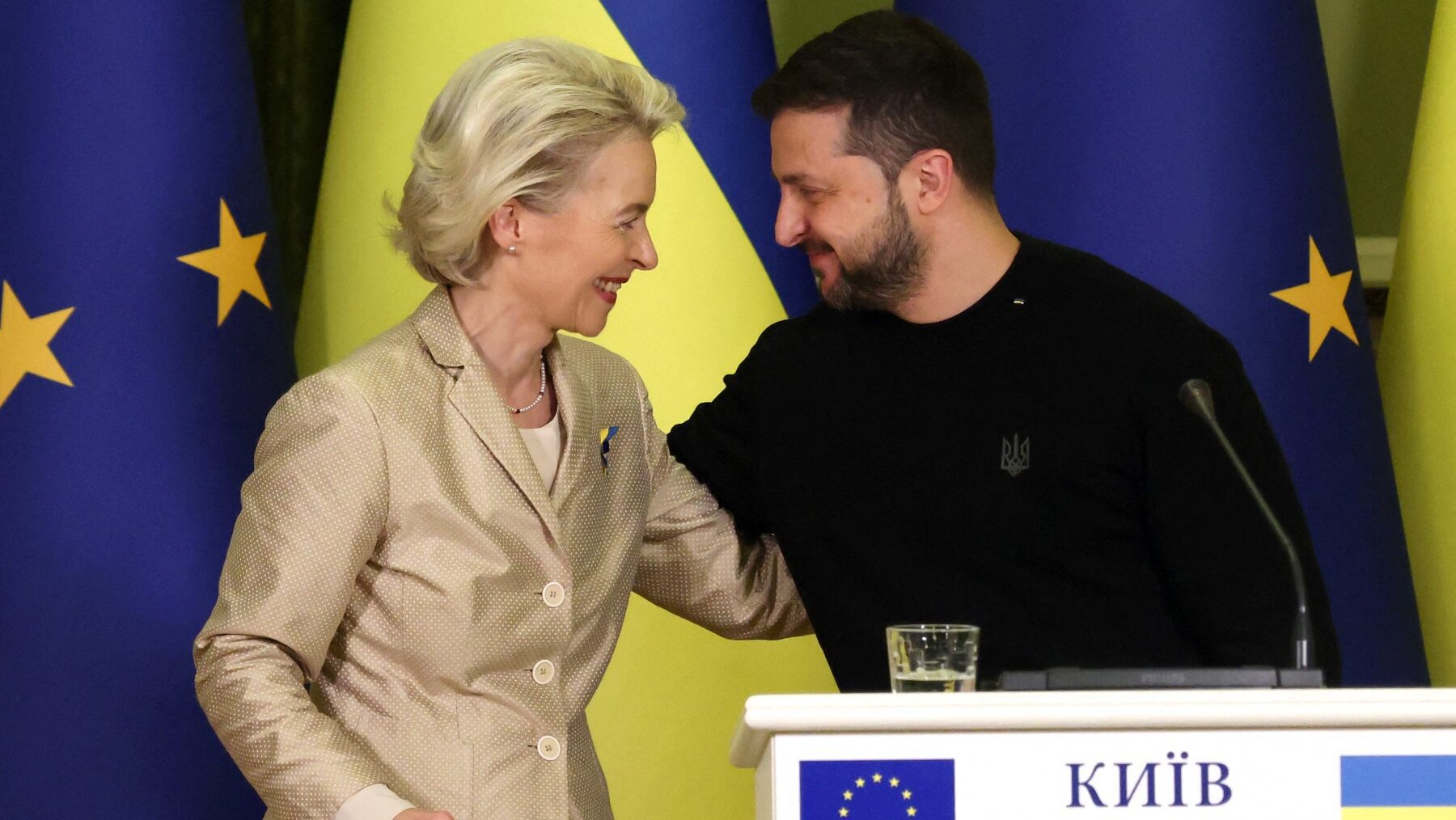
European Commission President Ursula von der Leyen (L) and Ukraine’s President Volodymyr Zelensky (R) give a joint press conference following their talks in Kyiv on November 4, 2023, amid the Russian invasion of Ukraine. European Commission President arrived in Kyiv to discuss Ukraine’s accession to the EU with Ukrainian President. Kyiv applied for EU membership just days after Russia’s invasion on February 24, 2022, and received candidacy status several months later in a strong signal of support from Brussels.
Photo: Anatolii STEPANOV / AFP
EU leaders reportedly want to start membership talks with Ukraine and Moldova at the end of June, before the start of the Hungarian EU Presidency, diplomats have said. Hungary generally supports EU enlargement but has warned about the dangers of accepting a country that is at war into the bloc. Ideological considerations should not play a part, Hungary says.
Member states granted EU candidate status to Ukraine two years ago in what was a symbolic gesture for the country which had just been invaded by Russia. The EU agreed to open accession negotiations with Ukraine (and Moldova) last December but the decision was not unanimous as Hungary’s Prime Minister Viktor Orbán left the European Council meeting room to allow the other 26 EU leaders to approve the start of talks with Ukraine.
The conservative government of Hungary has warned on a number of occasions about the dangers of incorporating a country that is currently at war into the EU, and about the economic consequences it would have for the bloc. Ukraine’s EU membership would cost the rest of the bloc at least €19 billion a year, significantly increasing member state contributions, and around half of all available EU agricultural grants would end up in Ukraine. As Viktor Orbán said:
Hungary’s position is clear; Ukraine is not prepared to start negotiations on EU membership. It is a completely senseless, irrational, and incorrect decision to start negotiations with Ukraine under these circumstances.
Hungary is also unwilling to accept Ukraine into the EU or NATO until it resolves the issues surrounding ethnic minority rights. Since 2015 Ukraine has restricted the rights of its ethnic minorities through various laws, restricting the use of Hungarian, Polish, Romanian, Russian, and other languages in schools and public spaces. The Hungarian minority—which lives in the westernmost region of Ukraine, Transcarpathia—is also increasingly threatened over its use of Hungarian flags and symbols and the singing of the Hungarian national anthem.
Budapest has maintained that Kyiv must give ethnic Hungarians their rights back before the hostility between the two countries can end. A meeting between Hungarian Foreign Minister Péter Szijjártó and his Ukrainian counterpart Dmytro Kuleba in January in Transcarpathia concluded with a preliminary agreement about restoring the Hungarian community’s language rights, but no meaningful steps have been made since. As László Brenzovics, head of the largest ethnic Hungarian political organisation, KMKSZ, told The European Conservative, negotiations between Hungarian and Ukrainian officials on the matter are still ongoing.
It is precisely these reservations that make it unlikely the Hungarian EU Council Presidency—which starts in July and ends in December—would want to deal with Ukraine’s accession, and why other member states wish to start membership talks before the Belgian Presidency ends in June. Another reason, according to diplomats who spoke to Politico, could be that Hungary wants to focus its attention on more pressing topics. Migration will probably be one of them.
Hungary hasn’t been the only country avoiding talk of Ukrainian EU membership since the decision to start accession negotiations last December. According to Politico, there have been concerns all around Europe “about making EU expansion a central theme of the European Parliament election,” which is set to take place on June 9th. Indeed, the energy crisis, the farmers’ protest and cheap Ukrainian agricultural imports flooding Europe, have all highlighted the frail economic situation, making Ukrainian accession a sensitive campaign issue.
As we previously reported, whether membership talks start or not, the path toward Ukraine’s full EU membership is littered with Council decisions that will require unanimity: negotiated chapters and accession itself can easily be vetoed by any member state. As spokesman for the Hungarian government, Zoltán Kovács said of Ukraine’s chances on Tuesday: “This is a merit-based process, there are no exceptions, the conditions apply equally to everyone, therefore there are no exemptions based on political or ideological considerations.”
